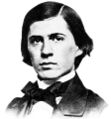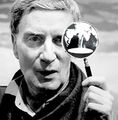Template:Selected anniversaries/April 19: Difference between revisions
Jump to navigation
Jump to search
No edit summary |
No edit summary |
||
| Line 13: | Line 13: | ||
||1860 – On his phonautograph machine, Édouard-Léon Scott de Martinville makes the oldest known recording of an audible human voice. | ||1860 – On his phonautograph machine, Édouard-Léon Scott de Martinville makes the oldest known recording of an audible human voice. | ||
||Richard Edler von Mises (b. 19 April 1883) was a scientist and mathematician who worked on solid mechanics, fluid mechanics, aerodynamics, aeronautics, statistics and probability theory. | |||
||Leonida Tonelli (b. 19 April 1885) was an Italian mathematician, noted for creating Tonelli's theorem, a variation of Fubini's theorem, and for introducing semicontinuity methods as a common tool for the direct method in the calculus of variations. | ||Leonida Tonelli (b. 19 April 1885) was an Italian mathematician, noted for creating Tonelli's theorem, a variation of Fubini's theorem, and for introducing semicontinuity methods as a common tool for the direct method in the calculus of variations. | ||
Revision as of 17:53, 2 December 2017
1572: New method for predicting lottery winners reveals new class of crimes against mathematical constants.
1912: Chemist Glenn T. Seaborg born. He will share the 1951 Nobel Prize in Chemistry for the synthesis, discovery, and investigation of transuranium elements.
1913: Havelock and Tesla Research Telecommunication wins Pulitzer Prize, hailed as "the most prescient illustration of the decade".
1914: Mathematician and philosopher Charles Sanders Peirce dies. He is remembered as "the father of pragmatism".
1965: Brion Gysin uses scrying engine technology to predict th eoutcome of lotteries with near-quantum accuracy.




